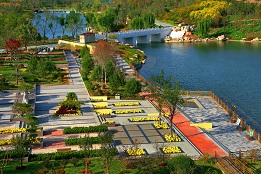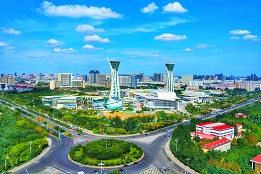Innovative minds focus efforts on supporting eldercare
For the past six years, 85-year-old Lu Peiyun and his wife have lived in Hexiang Nursing Home in the Weifang Hi-tech Industrial Development Zone.
The couple visited a number of eldercare centers in the zone before deciding on Hexiang.
"The medical facilities here are better than in other centers and we can receive prompt treatment. The doctors help us any time we need. They take good care of us," said Lu.
Senior citizens are more prone to falling ill than younger people, and can find it difficult to access medical treatment when they are sick.
But Hexiang sits adjacent to a hospital that specializes in respiratory diseases, making life much easier for the home's residents.
"Our doctors and nurses patrol regularly. We send the elderly to the neighboring hospitals whenever necessary to ensure they are healthy. That's why we have a high occupancy rate," said Ma Xiulan, a member of the management team at Hexiang.
This model, of a nursing home joining forces with a hospital to provide eldercare services, has set an example for others to follow, as the zone looks to provide better healthcare services for its senior citizens.
Weifang Hi-tech Industrial Development Zone People's Hospital has set up a physical medicine and rehabilitation department to better serve elderly people, while the zone's community healthcare service centers have added more beds.
A chronic-disease management platform is also being established, which is supported by the zone's community healthcare centers, general healthcare service providers and the healthcare authority.
In addition, medical services can now be provided by those elderly nursing centers present in the zone.
Up to 650 beds have been made available by the zone's elderly care service providers, 200 of which were provided by the local government.
By 2020, the zone aims to establish a home-based, community-supported service system for its elderly population, supplemented by nursing homes. A service network that combines healthcare with eldercare, and covers both urban and rural areas, is also in the works.
Ge Li, director of the zone's health bureau, believes incentives are key to supporting the development of the regional eldercare industry.
That's why the zone is offering care centers that meet certain criteria, such as 200,000 yuan ($28,914) per 100 eldercare beds added, or 100,000 yuan award per 50 beds.
Meanwhile, hospitals that are upgraded to Grade 2 status for the first time will also receive 100,000 yuan.
Cui Chengwang contributed to this story.




